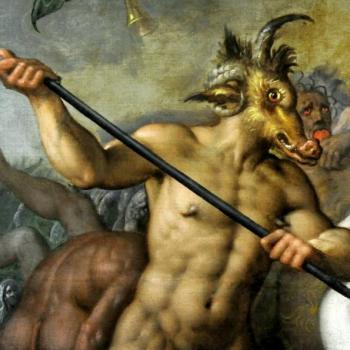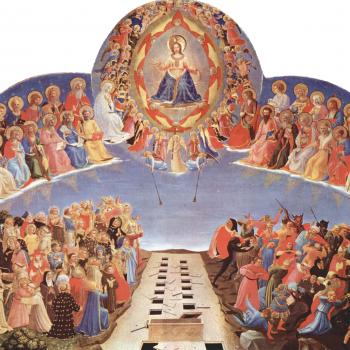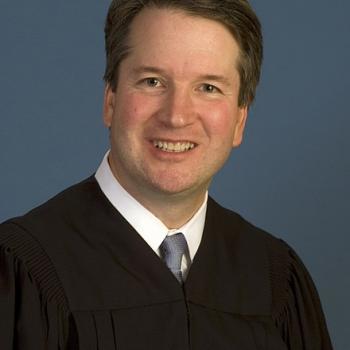The midterm elections are upon us, and once again we are hearing that we Catholics ought to be very careful about the way we cast our ballots, because we are, it is said, directly implicated in the actions of the candidates we vote for. That might make some of the more observant among us chary of voting at all, since the two political parties which have a reasonable prospect of winning both seem to favor some kind of evil.
The Democrats famously support legalized abortion, to the extent that the most strident proponents of same appear to be the party’s most powerful interest group. Of course, the Church considers abortion one of the most serious sins that one can commit. Catholic Democratic politicians have often tried to evade this stark disagreement between the Church and their party by saying that while they personally oppose abortion, they don’t believe that the law should force their opinion on others. But it’s not so easy.
The Catechism’s discussion of the Fifth Commandment (“You shall not kill”) describes the government’s duty when it comes to abortion this way:
“The inalienable right to life of every innocent human individual is a constitutive element of a civil society and its legislation:
 “’The inalienable rights of the person must be recognized and respected by civil society and the political authority. These human rights depend neither on single individuals nor on parents; nor do they represent a concession made by society and the state; they belong to human nature and are inherent in the person by virtue of the creative act from which the person took his origin. Among such fundamental rights one should mention in this regard every human being’s right to life and physical integrity from the moment of conception until death.’
“’The inalienable rights of the person must be recognized and respected by civil society and the political authority. These human rights depend neither on single individuals nor on parents; nor do they represent a concession made by society and the state; they belong to human nature and are inherent in the person by virtue of the creative act from which the person took his origin. Among such fundamental rights one should mention in this regard every human being’s right to life and physical integrity from the moment of conception until death.’
“’The moment a positive law deprives a category of human beings of the protection which civil legislation ought to accord them, the state is denying the equality of all before the law. When the state does not place its power at the service of the rights of each citizen, and in particular of the more vulnerable, the very foundations of a state based on law are undermined. . . . As a consequence of the respect and protection which must be ensured for the unborn child from the moment of conception, the law must provide appropriate penal sanctions for every deliberate violation of the child’s rights.’” (Catechism of the Catholic Church, no. 2273)
From the standpoint of Catholicism, then, the position of the Democratic Party on this issue is indefensible. And if we are directly implicated in the actions of politicians we vote for, it follows that no Catholic should vote for a candidate who supports the Democratic position.
But in discussing the same Fifth Commandment, the Catechism also says this:
“Concern for the health of its citizens requires that society help in the attainment of living-conditions that allow them to grow and reach maturity: food and clothing, housing, health care, basic education, employment, and social assistance.” (Id, no. 2288)
And with respect to the government’s duty to the family it says,
“The political community has a duty to honor the family, to assist it, and to ensure especially…
“— in keeping with the country’s institutions, the right to medical care, assistance for the aged, and family benefits….” (Id, no. 2211)
 Now the Republicans have been decidedly unfriendly to these concerns. For example, they tried to pass a healthcare bill that would have caused millions to lose their health insurance, and Senate majority leader Mitch McConnell has even been making the rounds proclaiming that it is time to make cuts to Social Security, Medicare, and Medicaid.
Now the Republicans have been decidedly unfriendly to these concerns. For example, they tried to pass a healthcare bill that would have caused millions to lose their health insurance, and Senate majority leader Mitch McConnell has even been making the rounds proclaiming that it is time to make cuts to Social Security, Medicare, and Medicaid.
Church teaching is clear that it is sin for the government to shirk its social safety net obligations. And if we are directly accountable for the actions of the politicians we vote for, it appears that Catholics shouldn’t vote for candidates who hold to the Republican position on this issue.
So should Catholics abstain from voting until a candidate comes along whose views perfectly accord with Catholic social teaching? That seems to be the logical course of action, if the sins of the candidates we choose are imputed to us. But here we run into a problem. The Catechism tells us that submission “to authority and co-responsibility for the common good make it morally obligatory…to exercise the right to vote….” (Id, no. 2240)
So the position we appear to be placed in is that we are required to choose between two individuals who want to do something bad, but that we will be guilty of the bad things our chosen candidate does if he is elected. That does not describe an enviable position to be in.
 Some will say that voting doesn’t present us with such a conundrum, and that we, as Catholics, should simply vote for the candidate who supports lesser evils than his opponent. For obvious reasons, this argument is often advanced by Catholics who support the Republican Party because of the abortion issue. But this idea can’t really give us any comfort, because it is established Catholic doctrine that one “may not do evil so that good may result from it.” (Id, no. 1756) It doesn’t matter if we think that the evil we’re engaging in is a lesser evil than the one we’re trying to prevent. We are not to do evil at all. But if the actions of candidates we vote for are to be imputed to us, we will be guilty of sin either way.
Some will say that voting doesn’t present us with such a conundrum, and that we, as Catholics, should simply vote for the candidate who supports lesser evils than his opponent. For obvious reasons, this argument is often advanced by Catholics who support the Republican Party because of the abortion issue. But this idea can’t really give us any comfort, because it is established Catholic doctrine that one “may not do evil so that good may result from it.” (Id, no. 1756) It doesn’t matter if we think that the evil we’re engaging in is a lesser evil than the one we’re trying to prevent. We are not to do evil at all. But if the actions of candidates we vote for are to be imputed to us, we will be guilty of sin either way.
It seems that Catholic political partisans are aware of this on some level when they start vociferously defending the obviously un-Catholic views of their preferred party as views that are supported by the Church, or at least permitted. It is human enough for people to engage in this sort of denial.
But if we remove from consideration the notion that we necessarily participate in the sins of the politicians we vote for, the dilemma disappears. And there is ample reason for taking this intellectual step.
Voting is an act that involves morality, and,
“The morality of human acts depends on:
“— the object chosen;
“— the end in view or the intention;
“— the circumstances of the action.
“The object, the intention, and the circumstances make up the ‘sources,’ or constitutive elements, of the morality of human acts.” (Id, no. 1750)
Now, the “object chosen morally specifies the act of the will, insofar as reason recognizes and judges it to be or not to be in conformity with the true good.” (Ibid, no. 1751) The object chosen here under discussion is exercising the right to vote, which is not only permitted for Catholics, but obligatory, because of our duty to the common good and for the proper respect of duly constituted authority. Voting in elections for public office is, therefore, a good act.
 But the intention is the critical element in this context.
But the intention is the critical element in this context.
“Because it lies at the voluntary source of an action and determines it by its end, intention is an element essential to the moral evaluation of an action. The end is the first goal of the intention and indicates the purpose pursued in the action. The intention is a movement of the will toward the end: it is concerned with the goal of the activity. It aims at the good anticipated from the action undertaken.” (Ibid, no. 1752)
Although voting is good and obligatory, our act of voting will not be a good act if we intend an evil consequence of that act. A person voting the Republican ticket because he believes that it will end legalized abortion is doing a good act. But if he votes Republican with the intent of abolishing the social safety net, or of placing further impediments on the right of labor to organize, he is engaged in a bad act. In the same way, a person voting the Democratic ticket because he wants to strengthen the safety net, or ensure that as many people as possible have health coverage, is doing a good thing. On the other hand, if he votes Democratic because he wants to keep abortion legal, and obtain government funding for the practice, he is doing a bad thing.
“The circumstances, including the consequences, are secondary elements of a moral act.” (Ibid, no. 1754) Unfortunately, in the present state of things, some evil is likely to be a consequence of picking one candidate or the other. And while circumstances “cannot change the moral quality of acts themselves…,” they can “contribute to increasing or diminishing the moral goodness or evil of human acts….” (Ibid.) In this context, Catholics are called upon to vote, and we must choose somebody, at least until “none of the above” becomes an option. Moreover, it seems that here we can consider a voter choosing what is in the best interests of his family, the people to whom he owes his primary obligations, regarding which no one should be dismissive.
Two things can be derived from all of this. The first is that Catholics must stop questioning the religious sincerity of their fellow Catholics who are in a different political party. This sort of thing used to be common sense, and when we engage in it we become useful idiots for cynical political operatives and manipulators. The Kingdom of God will not come through a political election, and we simply have to put these things in perspective. Most of all, it would be sin in us to allow politics to divide Christ’s Body.
 Secondly, we must stop making excuses for whatever political party we happen to favor. Both parties propose things that are at odds with Catholic teaching, and this should be frankly acknowledged by all Catholics, Republican and Democrat. Given that this is so, we might consider that the reason why there are Catholics in both parties is not because some are orthodox and others flirt with heresy. Perhaps there are Catholics in both parties because we are supposed to be moving the parties in which we find ourselves in a more Catholic direction. Perhaps we are supposed to be the salt of the earth, even in this context. Perhaps we should be changing our parties rather than letting them change us, and leave aside the spectacle of Catholics slinging mud at each other on behalf of interests which are destined to pass away.
Secondly, we must stop making excuses for whatever political party we happen to favor. Both parties propose things that are at odds with Catholic teaching, and this should be frankly acknowledged by all Catholics, Republican and Democrat. Given that this is so, we might consider that the reason why there are Catholics in both parties is not because some are orthodox and others flirt with heresy. Perhaps there are Catholics in both parties because we are supposed to be moving the parties in which we find ourselves in a more Catholic direction. Perhaps we are supposed to be the salt of the earth, even in this context. Perhaps we should be changing our parties rather than letting them change us, and leave aside the spectacle of Catholics slinging mud at each other on behalf of interests which are destined to pass away.
So for the rest of this election season let’s be mindful of St. Paul’s words to the Ephesians:
“I, a prisoner for the Lord, urge you to live in a manner worthy of the call you have received, with all humility and gentleness, with patience, bearing with one another through love, striving to preserve the unity of the spirit through the bond of peace: one body and one Spirit, as you were also called to the one hope of your call; one Lord, one faith, one baptism; one God and Father of all, who is over all and through all and in all.” [2]
And,
“Do not grieve the Holy Spirit of God, with which you were sealed for the day of redemption.
All bitterness, fury, anger, shouting, and reviling must be removed from you, along with all malice. And be kind to one another, compassionate, forgiving one another as God has forgiven you in Christ.” [3]
The icon of St. Joseph the Worker is by Daniel Nichols.
Please go like Christian Democracy on Facebook here. Join the discussion on Catholic social teaching here.
Excerpts from the Lectionary for Mass for Use in the Dioceses of the United States of America, second typical edition © 2001, 1998, 1997, 1986, 1970 Confraternity of Christian Doctrine, Inc., Washington, DC. Used with permission. All rights reserved. No portion of this text may be reproduced by any means without permission in writing from the copyright owner.












